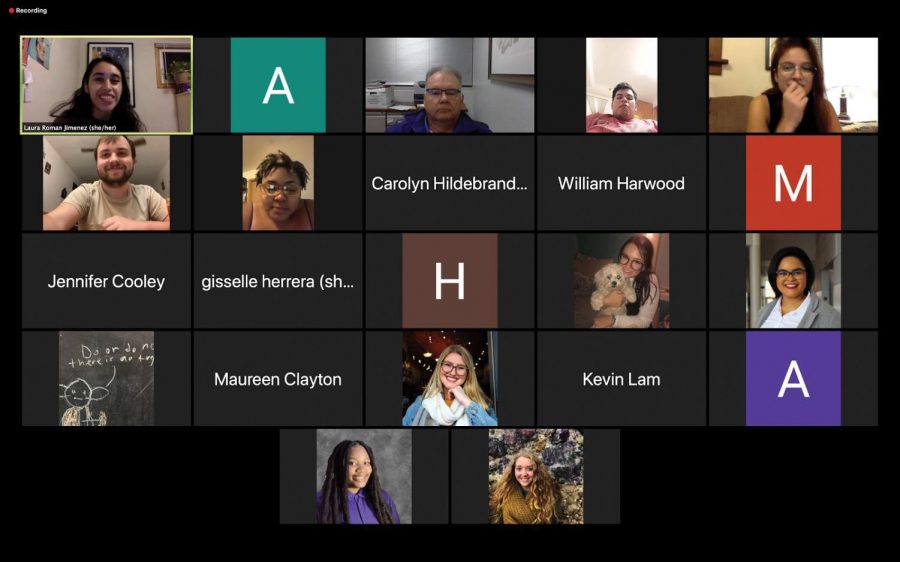REC holds virtual town hall
Sep 10, 2020
UNI’s Racial and Ethnic Coalition (REC) held their first virtual town hall meeting of the semester on Monday, Sept. 7 with about 22 participants present.
The meeting began with a short history of the creation of REC, which formed during the controversy regarding the Waka Flocka Flame concert in the spring of 2019. The Campus Activities Board (CAB) had engaged the Black artist to perform in Maucker Union, but shortly prior to the concert, the UNI administration moved the event to the Nielsen Fieldhouse off-campus. Although the concert was later returned to Maucker, it remained closed to the public, with only students able to attend.
Ryan Frank, fifth-year social work and Spanish major and co-founder of REC, said there “wasn’t any clear reasoning” why the UNI administration moved the concert’s location and restricted ticket sales to the public.
“Things did not add up, and we just basically ran around in circles until we finally got out of the administration that the reason why they closed it off was due to alleged claims of gang activity that were going to happen at the concert,” he said. “There was no legitimized evidence to prove that this was going to happen. So it was a false claim, and it was clear from our conversations that the senior leadership at the university had been participating in implicit racial bias to prevent the black community at Waterloo from attending the concert.”
In the aftermath of the event, REC hosted multiple town halls, particularly for students with diverse racial backgrounds, to hear about their experiences and inform the coalition’s goals. These six short-term goals, which were agreed upon by UNI’s senior leadership team in the spring of 2019, included demands for the university to promote multicultural events and define where students would go if a bias incident occurred.
REC members stated that, after they did not see progress on these goals in the coming months, even after multiple extensions, they launched their social media campaign
#UNIisnotanAlly in the fall of 2019.
The organization has since expanded their focus beyond social justice issues and are working to ensure that all marginalized students of all walks of life have their voices heard.
“REC is a leftist organization fighting to overthrow unjust hierarchy, promote justice and equity,” explained Mohammed Rawwas, an MIS, computer science and philosophy major and an active member of REC. “The university is a small scale example of the same power dynamics that we see play themselves out on the national and global stages and as such our work on UNI’s campus is a reflection of larger struggles against capitalism and oppression that occur constantly on a global scale.”
One of the organization’s current concerns is UNI’s Council for Inclusion, Transformative Social Justice and Advocacy (CITSJA), a group created by President Nook as a direct response to REC.
REC members asserted that there is a lack of student representation in the CITSJA and a lot of speculation about the effectiveness of the program. REC has since created a counterproposal in response to CITSJA called the Council on Solidarity and Social Justice, a more than 50-page, “extensively researched” document which encases their ideal view of diversity on campus.
The town hall also included a discussion of REC’s concerns regarding the mandate placed on UNI by Iowa law forcing them to buy furniture made from prison labor.
“Prison labor is modern day slavery, and the prison labor in Iowa average 80 cents an hour, so we’re calling on the administration to lobby for this law to be changed and lobby against the issues of mass incarceration in general,” said Rawwas.
REC members also voiced their concerns regarding UNI’s approval of military training in the same building as the on-campus child development center, as well as the basic dangers of COVID-19 and student/staff exposure.
“This is ultimately a decision that the university administration made knowing full well that the consequences of those actions would be severe as we have seen from UNI’s own numbers,” said social work major and REC member Gisselle Herrera. “There have been dozens of cases amongst students due to the return on campus in the first few weeks alone.”
Town hall participants also expressed concern with a statement made by NISG Student Body President Elle Boeding, a student member of UNI’s COVID-19 response team, indicating the possibility of a rise in campus COVID-19 testing costs to $80.
The meeting concluded with a Q&A session, in which REC members emphasized the organization’s push to prevent them from just being a one-and-done thing. Moving forward, they hope to recruit more students and communicate their message with the help of the #UNIisnotanAlly social media websites.














